Eating fresh fruits regularly can lower your risk of heart attack, stroke and cardiovascular death, according to a study published in the New England Journal of Medicine.
Researchers at the University of Oxford and Chinese Academy of Medical Sciences studied 5,12,891 adults aged 30-79 from 10 diverse urban and rural regions across China. The health status of the participants, who did not have a history of cardiovascular disease at the start of the study, were tracked for seven years. The participants also reported their daily fruit consumption.
Only 18 per cent of the participants consumed fresh fruits daily. Those who ate fresh fruits (mostly apples and oranges) daily had lower blood pressure and glucose levels, which translated to lower risk for heart attack and stroke, compared to those who never or rarely ate fresh fruits.
The association was similar in both men and women.
"Fruit consumption is important for your cardiovascular health," said the lead researcher.

Aspirin guidelines
The US Preventive Services Task Force is recommending a daily aspirin for the primary prevention of cardiovascular disease and colorectal cancer in certain adults aged 50 to 69 years.
Daily low-dose aspirin is recommended for adults aged 50 to 59 years who have a 10 per cent or greater risk of heart attack or stroke in the next decade, who do not have an increased bleeding risk, who have at least a 10-year life expectancy, and who are prepared to take aspirin daily for at least 10 years.
Risk factors for cardiovascular disease include older age, high blood pressure, high cholesterol, diabetes and smoking.
For those aged 60 to 69 years, the decision to take aspirin should be based on individual cases as aspirin can increase the risk of bleeding. For those younger than 50 years and older than 70 years, there isn’t sufficient data to recommend aspirin for primary prevention.
“Before starting to take aspirin for primary prevention, people aged 50 to 69 should talk to their primary care clinician to understand their risk of cardiovascular disease and risk for bleeding," the chair of the task force suggested. The recommendations were published in the Annals of Internal Medicine.
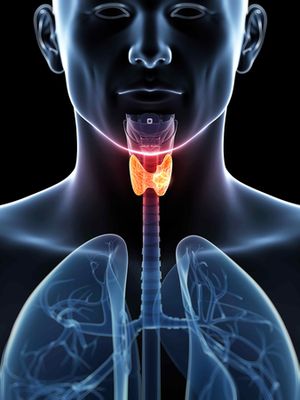
It's not cancer
An international panel of doctors has reclassified a type of thyroid cancer as non-cancer, sparing thousands of people worldwide unnecessary surgeries, aggressive treatments with radioactive iodine and eliminating the psychological consequences of facing the diagnosis of a tumour which is actually non-invasive with a low risk of recurrence.
Experts from seven countries and four continents independently reviewed 268 samples of a tumour type known as encapsulated follicular variant of papillary thyroid carcinoma (EFVPTC) diagnosed as cancer from 13 institutions. EFVPTC is often treated as aggressively as conventional thyroid cancer even though studies have shown that it is non-progressive and is not dangerous.
After analysing cellular features, tumour invasion and other factors, the panel decided to rename EFVPTC as "noninvasive follicular thyroid neoplasm with papillary-like nuclear features" or NIFTP—dropping the word carcinoma from the terminology.
According to the senior investigator, thyroid cancer cases have been increasing partly owing to early detection of tumours that are non-progressing, despite the presence of certain cellular abnormalities that are traditionally considered cancerous.
"This phenomenon is known as over diagnosis. To my knowledge, this is the first time in the modern era a type of cancer is being reclassified as a non-cancer. I hope that it will set an example for other expert groups to address nomenclature of various cancer types that have indolent behaviour to prevent inappropriate and costly treatment," he said.
Did You Know
According to new clinical practice guidelines issued by the American College of Physicians, both cognitive behavioural therapy and second-generation antidepressants are equally effective in treating major depressive disorder in adults.
Annals of Internal Medicine
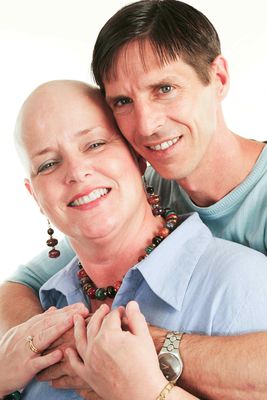
Bolstered by better half
Marital status can affect cancer survival. According to a study published in the journal Cancer, cancer patients who are married tend to live longer than unmarried patients.
The researchers looked at 7,83,167 people who were diagnosed with invasive cancer between 2000 and 2009, and they were followed through 2012 during which there were 3,86,607 deaths.
Compared to married cancer patients, unmarried cancer patients had higher death rates. Unmarried men had a 27 per cent higher death rate than married men. For women, the death rate was 19 per cent higher among the unmarried patients.
While economic factors such as having private health insurance and living in better neighborhoods played a role, the social and emotional support that a marriage provided was the key driver. Health care providers who treat unmarried cancer patients should see if these patients have someone within their social network to help them physically and emotionally.
“Research is needed to understand the specific reasons behind these associations so that future unmarried patients can receive interventions to increase their chances of survival," the study author noted.
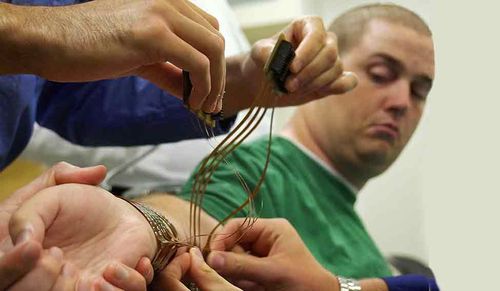
Smart chip
An implanted brain chip has helped a quadriplegic man move his fingers and even play video games by harnessing his thoughts.
Ian Burkhart's arms and legs were paralysed in a diving accident at age 19. A computer chip implanted in his brain works with a software to help Burkhart's thoughts travel from his brain to his hands, bypassing the damaged spinal cord. The pea-sized chip is implanted in his motor cortex, which controls movement.
The chip is connected to a cable running from his head to a sleeve containing 130 electrodes wrapped around his forearm. The chip relays his thoughts through the electrodes, helping his mind control his hand and fingers.
When the chip was first implanted in 2014, Burkhart could just open and close his hands. Burkhart worked for months using the electrode sleeve to stimulate his forearm. Now he can perform six different wrist and hand movements. He can do more complex tasks such as pick up objects, swipe a credit card, stir liquids, hold a bottle up to his mouth, pick up a phone and even play video games.
"We're showing for the first time that a quadriplegic patient is able to improve his level of motor function and hand movements. We're hoping that this technology will evolve into a wireless system connecting brain signals and thoughts to the outside world to improve the function and quality of life for those with disabilities. One of our major goals is to make this readily available to be used by patients at home," the study co-author added.
The findings were published in the journal Nature.
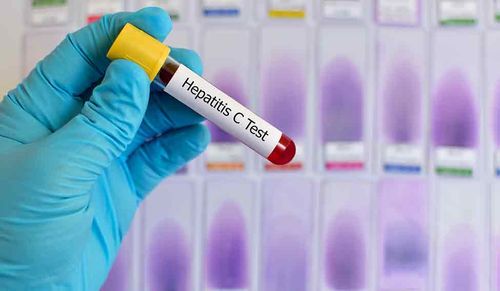
HCV heightens risk
Hepatitis C virus (HCV) may increase the risk of certain types of head and neck cancers, according to a study published in the Journal of the National Cancer Institute.
Hepatitis C is a common blood-borne virus that can cause serious liver infection. Hepatitis C is already known to significantly increase the risk of liver cancer and non-Hodgkin's lymphoma 48-fold and two-to three-fold, respectively.
The researchers focused on 34,545 patients who were tested for hepatitis C. Patients with hepatitis C infection had a 2.4 times increased risk for oral cavity cancers, 2.04 times greater risk for oropharynx cancers and 4.96 times increased risk for larynx cancers. Head and neck cancer patients with hepatitis C were also more likely to have human papillomavirus (HPV).
"What we are trying to make all understand is that this is an infection that has consequences—and it's an infection we can cure," said the study author. Antiviral drugs can cure more than 90 per cent of hepatitis C cases.
The findings highlight the importance of screening for HCV because treatment with antiviral drugs can possibly prevent cancer from developing in the first place, as has been reported in the case of liver cancers and non-Hodgkin’s lymphoma.

Sleep shield
Getting a good night’s sleep has a direct bearing on our physical and mental health. Now a study published in JAMA Internal Medicine finds that people who are sleep deprived are more susceptible to common cold and other common infections.
The study surveyed 22,726 participants about their sleep habits, history of sleep disorders and whether they had suffered a cold, flu, pneumonia or ear infection in the past month. Short sleepers, or those who slept for five hours or less on an average were 28 per cent more likely to have had a cold in the past month, and 82 per cent more likely to have had the flu, pneumonia or an ear infection compared to those who slept for about eight hours on an average. Those with a diagnosed sleep disorder were also more likely to have had a cold or infection in the past month.
A 2015 study had also shown that among people exposed to the cold virus, those who slept for six or fewer hours were about four times more likely to develop a cold than those who slept for more than seven hours.
Sleep deprivation can adversely affect the immune system, crippling our ability to fight infections.
Did You Know
Smokers find it harder to find jobs and when they do, they earn less than nonsmokers.
JAMA Internal Medicine
Hormone blues
Men who receive hormone therapy for prostate cancer may have a higher risk of developing depression, according to a US study published in the Journal of Clinical Oncology.
Hormone therapy, or androgen deprivation therapy (ADT), aims to suppress testosterone levels because it can feed the cancer's growth.
The researchers reviewed data on 78,552 men older than 65 years who had been treated for prostate cancer; 33,382 of them had hormone therapy.
Patients who received ADT had a 23 per cent increased risk of depression and a 29 per cent increased risk of inpatient psychiatric treatment compared to patients who received other treatments.
The risk of depression rose with the duration of ADT. There was a 12 per cent increased risk with less than six months of treatment, 26 per cent with 7 to 11 months of treatment and 37 per cent risk with 12 months or longer.
The side effects of ADT include decreased sexual function, weight gain and fatigue—factors that could contribute to depression. “ADT is not a good choice for low-risk patients. Among patients with intermediate-risk prostate cancer, the potential benefits of ADT must be weighed against the potential harms, including increased depression risk."
For high risk patients, however, ADT can improve survival odds.
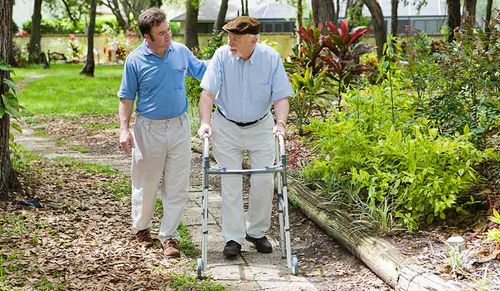
Care well
Alzheimer’s disease is a progressive brain disorder that slowly destroys your memory and cognitive skills, and even simple tasks become very difficult.
Caring for a loved one with Alzheimer’s is not easy. Here are simple tips from the US Mayo Clinic.
Setting a schedule or routine is extremely important. It makes each day more predictable and less confusing. Try to schedule the most difficult tasks—such as bathing or medical appointments—at a time during the day when they are usually at their calmest.
Adapt to your loved one's needs. If they insist on wearing the same clothes every day, buy a few identical outfits.
Since getting them to do tasks will take longer, leave plenty of time to complete tasks instead of hurrying them.
Allow them to do tasks that they can do on their own with little assistance.
Limiting choices will make it easier for them. Instead of a closet full of clothes, offer them two outfits to pick from.
Reduce distractions by turning off the TV at mealtime and during conversations, so they can better focus on what they have to do. Consider safety precautions: remove extension cords and other clutter to prevent falls. Install handrails in appropriate places. Keep potentially dangerous things such as medicine, alcohol, toxic cleaning substances, and utensils and tools locked. Don’t leave matches and lighters around.
Did You Know
People who are rich enjoy a longer life than poor people; the richest 1 per cent live nearly 15 years longer than the poorest 1 per cent.
Journal of the American Medical Association

Early warning
Teens who are overweight or obese and even those in the high range of normal body mass index face an increased risk of death from heart disease and stroke in middle age.
For the study in the New England Journal of Medicine, researchers followed 2.3 million Israeli adolescents from 1967 to 2010.
By 2011, there were 32,127 deaths: 2,918 were from cardiovascular causes, including 1,497 from coronary heart disease, 528 from stroke and 893 from sudden death. The mean age for death from coronary heart disease was 47.4 years and 46 years for stroke.
Obese teenagers were five times more likely to die of coronary heart disease by middle age, compared to those who had normal weight. They also had a 2.6 times greater risk of death from stroke and 3.5 times greater risk of death from all cardiovascular causes.
Even adolescents at the higher end of normal BMI had a significantly higher risk of death from coronary heart disease and total cardiovascular causes in middle age.
"This study stresses the importance of maintaining a healthy weight [during] childhood and adolescence," the study author noted.
The findings have added significance since the number of overweight and obese teens has grown substantially in recent years.
Contributor: SHYLA JOVITHA ABRAHAM






